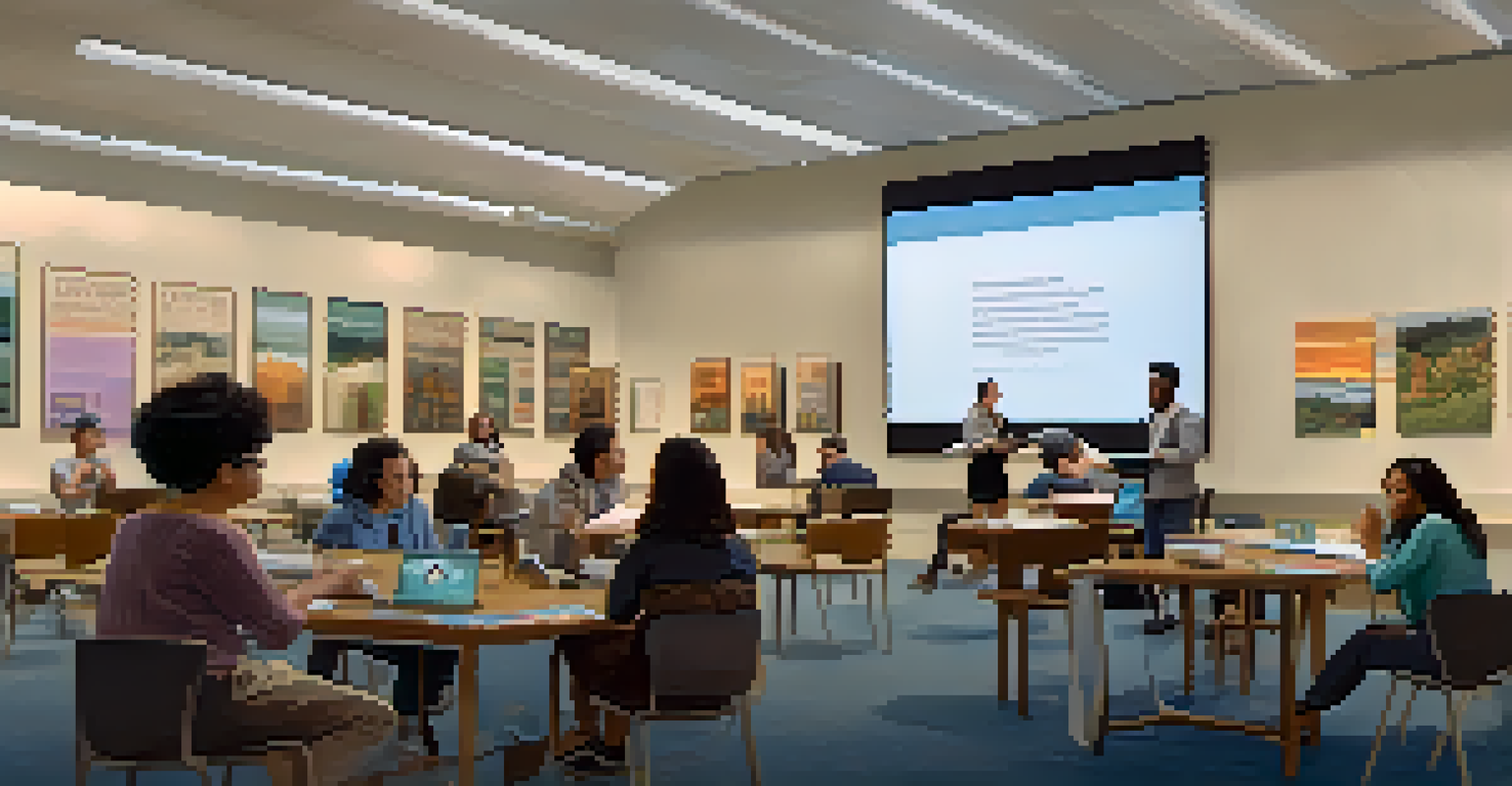Public Libraries in Scottsdale: History Research Tools

A Brief History of Public Libraries in Scottsdale
Scottsdale's public libraries have a rich history that reflects the city's growth. Established in the early 1900s, the first library was a modest collection of books housed in a local school. Over the decades, as the population increased, so did the demand for accessible information and community resources.
A library is not a luxury but one of the necessities of life.
In 1960, the city recognized the need for a dedicated library and opened the first official Scottsdale Public Library. This marked a significant step towards providing citizens with educational resources and community programs. The library quickly became a hub for residents, fostering a love for reading and lifelong learning.
Today, Scottsdale boasts multiple library branches, each offering unique resources and programs. The evolution of these libraries showcases the community's commitment to education, culture, and civic engagement, making them essential pillars of Scottsdale.
Key Research Tools Available at Scottsdale Libraries
One of the standout features of Scottsdale's public libraries is the array of research tools they offer. From digital archives to physical collections, these resources are invaluable for anyone conducting historical research. Patrons can access databases that include newspapers, journals, and even genealogy resources, making it a treasure trove for history enthusiasts.

Moreover, many libraries in Scottsdale provide access to online platforms like Ancestry.com or HeritageQuest. These tools empower users to trace their family histories and learn more about their roots. In addition to genealogy, the libraries also offer access to academic journals, e-books, and reference materials that cater to a variety of research needs.
Rich History of Scottsdale Libraries
Scottsdale's libraries have evolved from a small collection in a school to multiple branches that serve as community hubs for education and culture.
With knowledgeable librarians available to assist, visitors can easily navigate these tools. Whether you're a student, a professional researcher, or simply curious, Scottsdale's libraries equip you with the means to uncover the past and enrich your understanding of the world.
Community Programs Supporting Historical Research
Scottsdale's public libraries are not just about books; they are also vibrant community centers that host a variety of programs. Many libraries regularly schedule workshops and lectures focused on historical topics, inviting local historians and authors to share their expertise. These events provide residents with opportunities to engage with history in meaningful ways.
Libraries store the energy that fuels the imagination. They open up windows to the world and inspire us to explore and achieve, and contribute to improving our quality of life.
In addition to lectures, the libraries often organize book clubs and discussion groups centered around historical literature. These gatherings encourage community members to dive deeper into historical narratives while fostering connections with others who share similar interests. Such programs enrich the local culture and promote lifelong learning.
Furthermore, the libraries frequently collaborate with local schools and organizations to provide educational resources for students. By offering programs that support historical research, Scottsdale's libraries help cultivate a well-informed community, making history accessible and engaging for everyone.
Accessing Digital Resources from Home
In our increasingly digital world, Scottsdale's public libraries have adapted by offering a wealth of online resources. With a library card, patrons can access e-books, audiobooks, and databases from the comfort of their homes. This convenience makes it easier than ever to conduct research or enjoy a good book without needing to visit the library in person.
Additionally, many libraries provide virtual workshops and tutorials on how to use their digital resources effectively. These sessions are particularly beneficial for those who may be less familiar with technology. By empowering patrons with the skills to navigate online tools, libraries ensure that everyone can access vital information.
Valuable Research Tools Available
The libraries provide access to extensive research tools, including digital archives and genealogy resources, making them essential for historical research.
From historical documents to contemporary literature, the digital offerings expand the reach of Scottsdale's libraries. This commitment to accessibility ensures that all community members can engage with historical research, regardless of their schedules or mobility.
Special Collections and Archives in Scottsdale Libraries
Scottsdale's public libraries house special collections and archives that are a goldmine for historical research. These collections often include rare books, manuscripts, photographs, and local history materials that offer unique insights into the area’s past. For anyone interested in the history of Scottsdale and its development, these resources are invaluable.
One notable collection is the Scottsdale Historical Society's archives, which contain documents and artifacts that preserve the city's rich heritage. Accessing these materials can provide a deeper understanding of Scottsdale's evolution, from its founding days to the modern era. This makes the library not just a place for borrowing books, but a repository of local knowledge.
Researchers, students, and history buffs alike can benefit from delving into these special collections. By highlighting local history through curated exhibits and events, Scottsdale's libraries play a crucial role in promoting community identity and pride.
Collaborations with Local Historical Societies
Scottsdale's public libraries often collaborate with local historical societies to enhance their offerings. These partnerships bring together resources and expertise, creating a richer experience for patrons interested in historical research. By working together, libraries and historical societies can organize events that highlight Scottsdale's unique history.
For example, joint programs may include walking tours, lectures, or exhibitions that showcase significant historical sites within the community. These events not only educate attendees but also foster a sense of community and connection to the local heritage. Such collaborations are beneficial for both organizations as they reach broader audiences.
Engaging Community Programs Offered
Through workshops, lectures, and book clubs, Scottsdale's libraries foster community engagement and promote lifelong learning around historical topics.
Moreover, these partnerships often lead to the development of specialized resources that can be accessed through the libraries. Whether it's digitized archives or curated content, the synergy between libraries and historical societies enhances the overall research experience for residents.
Navigating Library Resources: Tips and Tricks
Navigating the various resources available at Scottsdale's public libraries can be a bit overwhelming, especially for newcomers. However, with a few tips and tricks, users can easily find what they need. First and foremost, taking advantage of the library's website is essential; it offers a wealth of information about available resources, programs, and operating hours.
Another valuable tip is to speak with the librarians. They are trained professionals who can guide you to the right resources and help you with your research queries. Don't hesitate to ask for assistance; they can provide recommendations based on your interests and needs, making your research journey smoother.

Lastly, participating in library programs can enhance your experience. Whether it's attending a workshop or joining a book club, these activities can provide insights into using library resources effectively while connecting you with fellow history enthusiasts. Embracing the library community can turn research into an enjoyable and enriching experience.